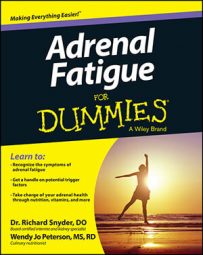You may find that you need to undergo hormone replacement therapy for sex hormones as part of your treatment for adrenal fatigue. But be cautious. Do not take random doses of hormones yourself. Hormone replacement should be done under the guidance of a qualified health professional.
How to use testosterone for adrenal fatigue
If your testosterone levels are low, your healthcare practitioner will probably suggest testosterone replacement. The benefits of testosterone therapy (usually in men) include the following:
Improved energy levels
Increased libido
Improved mood and sense of well-being
(Note that testosterone can be prescribed for a woman, depending on her hormonal profile.)
The most common type of testosterone replacement is either a gel form or a patch. Your practitioner will follow your levels after you start on testosterone therapy.
One example of a gel form, Androderm, is often applied to the skin on a daily basis. Modifications in dosing depend on follow-up testing of testosterone and other hormonal levels. If your testosterone level is still low, for example, the gel form can be applied to the skin twice a day.
Here are some potential side effects of testosterone therapy:
It can affect sleep quality. It may worsen symptoms of sleep apnea in some people, particularly if they haven't been treated for this condition.
It may increase the risk of heart disease.
It may increase the risk of developing certain types of skin problems, such as pimples and acne.
In some men, the liver may process (or metabolize) the testosterone into estrogen. This can cause men to develop breasts and gain weight. That's why following the hormonal profile after testosterone replacement begins is so important.
If you have a history of cancer, especially prostate cancer, then testosterone replacement may not be for you. Testosterone can increase the growth of prostate tissue, which is the last thing you want if you have prostate cancer.
How to use estrogen for adrenal fatigue
If your estrogen levels are low, supplementation may be a good idea. One of the most common forms of natural supplementation comes in the form of estradiol, which is made from soy. Benefits may include the following:
Helping to maintain and/or improve bone density (that is, decreasing the risk of developing osteoporosis)
Heart protection
Improved memory and cognition
There are many ways to administer estradiol. Two of the most common ways are the transdermal patch and cream. Estradiol cream doesn't dramatically increase the risk of cancer the way the oral form of estrogen may do. Another way to administer estradiol is a gel form that's given once daily; hormone levels are followed, and the dose of the gel can be adjusted as needed.
One of the main reservations about prescribing estrogen in the past came from the increased risk of breast and endometrial cancer. This concern came about from the Nurses’ Health Study, which has followed 230,000 female registered nurses since 1976 to assess risk factors for cancer and cardiovascular disease.
The first study surveyed 122,000 women over the course of about 10 years. It demonstrated that the use of estrogen in addition to the use of synthetic progesterone increased the risk of developing breast cancer. The results of the study also concluded that estrogen given alone increased the risk of cancer.
A study from Postgraduate Medicine in 2009 did a review of the available papers concerning the safety of bioidentical hormone supplementation, namely estradiol and progesterone. The authors concluded that the use of bioidentical hormones was associated with a decreased risk of breast cancer and heart disease compared to the synthetic and animal-derived forms of the hormones.
How to use progesterone for adrenal fatigue
Progesterone is a hormone important for regulating the menstrual cycle, maintaining mood and thinking, and regulating sleep in women. The benefits of progesterone therapy include the following:
Improved sleep quality
Improved memory and cognition, including resolution of brain fog
Improved mood
There are many ways to prescribe progesterone, including orally and in the form of a cream. Most healthcare practitioners prefer progesterone cream because it seems to have fewer side effects. The cream is often applied on a daily basis.
The side effects of using progesterone can include the following:
Sleeping too much: Progesterone deficiency is associated with insomnia. Too much progesterone can cause the opposite problem: increased drowsiness and lethargy. If you have this symptom, you may need to have your dosage adjusted.
Gaining weight: This side effect isn't felt to be a major issue, because the weight gains aren't huge.
Certain vitamin and mineral deficiencies can decrease your body's ability to produce progesterone naturally. The good news is that B vitamins (especially vitamin B6) and vitamin C can help boost your adrenal production of progesterone. In addition, zinc is important in treating progesterone deficiency, so supplementing with zinc can also help boost your body's progesterone levels. Foods high in magnesium can increase progesterone levels, too.
Foods and herbs that increase the estrogen levels in the body may also have an effect of lowering progesterone levels. Avoid certain herbal supplements, including black cohosh, licorice, saw palmetto, and hops.

